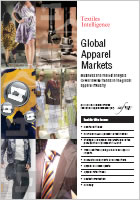Issue
7:
3rd Quarter 2009

Product Overview
Buy this Report now
Buy this Issue now
Subscribe
Download brochure (PDF)
Download price list (PDF)
Price list download
| Please choose your preferred currency:
|
Request sample issue
View list of reports
in other issues
|
Multi Report Package |
We also offer a flexible subscription product,
the Multi Report Package,
which allows you to select your own choice of reports from our full range,
to suit your own budget.
Click here for full details.
|
|
 |
Product life cycle management in the apparel industry |

24 pages,
published in Issue 7, 3rd Quarter 2009
Report price:
Euro 395.00;
US$ 520.00
|
Product life cycle management (PLM) is a set of business processes and supporting tools which help firms to improve the way they manage their product development. It is particularly useful for apparel manufacturers who need to respond to new fashion trends quickly or collaborate closely with customers and suppliers in order to remain competitive. In general terms, PLM systems can help companies to improve their internal and external communications, ensure that everyone is using the same data, and organise the flow of data between participants involved in a product?s supply chain.
Several software companies offer specialised PLM packages which are geared to the textile and apparel industry?including large global organisations such as Lawson and Lectra as well as smaller software suppliers such as Yunique and DeSL. Other suppliers include PTC and Dassault Systèmes, which began by developing software for the engineering industries and adapted their systems to the needs of soft goods companies. Specialised PLM packages are designed to support a number of key processes and activities in the clothing industry, including line planning, storyboarding, colour management, computer aided design (CAD), management of fabrics and trims, management of product data, cost estimation, sourcing and supplier management, tracking a product?s development, acquiring and storing business intelligence, and reporting.
The Hong Kong-based apparel manufacturer TAL Apparel is using a product called Lawson Fashion PLM to collaborate with its suppliers on the development of textiles and trims. TAL Apparel?s sister company in the USA, The Apparel Group, is using the same product to develop fabric and garment specifications with its textile suppliers, with TAL, and with garment factories.
The benefits to be gained from using a PLM system are clear and measurable?provided the system is planned, designed and implemented with care. They include faster time-to-market, an improved cost structure, and an improvement in quality. Some textile and apparel companies have reduced their re-sampling by 25-40% while others have increased their component reuse by up to 30%. Gini & Jony?India?s leading brand of clothes for children and young adults?has found that its PLM system has provided it with more time to focus on creativity, by enabling it to cut the time spent recording the details of each new range by up to 50%.
- Product life cycle management in the apparel industry
-
- Summary
- Introduction
- Development of product life cycle management (PLM) software and systems
- Processes and activities supported by product life cycle management (PLM) software
- Benefits of product life cycle management (PLM) software
- Types of product life cycle management (PLM) software systems
- Factors to consider when choosing product life cycle management (PLM) software
- Implementing product life cycle management (PLM) software and systems
- Conclusions
- Appendix: phases of a product's life cycle
- Selected useful contacts
|
 |
